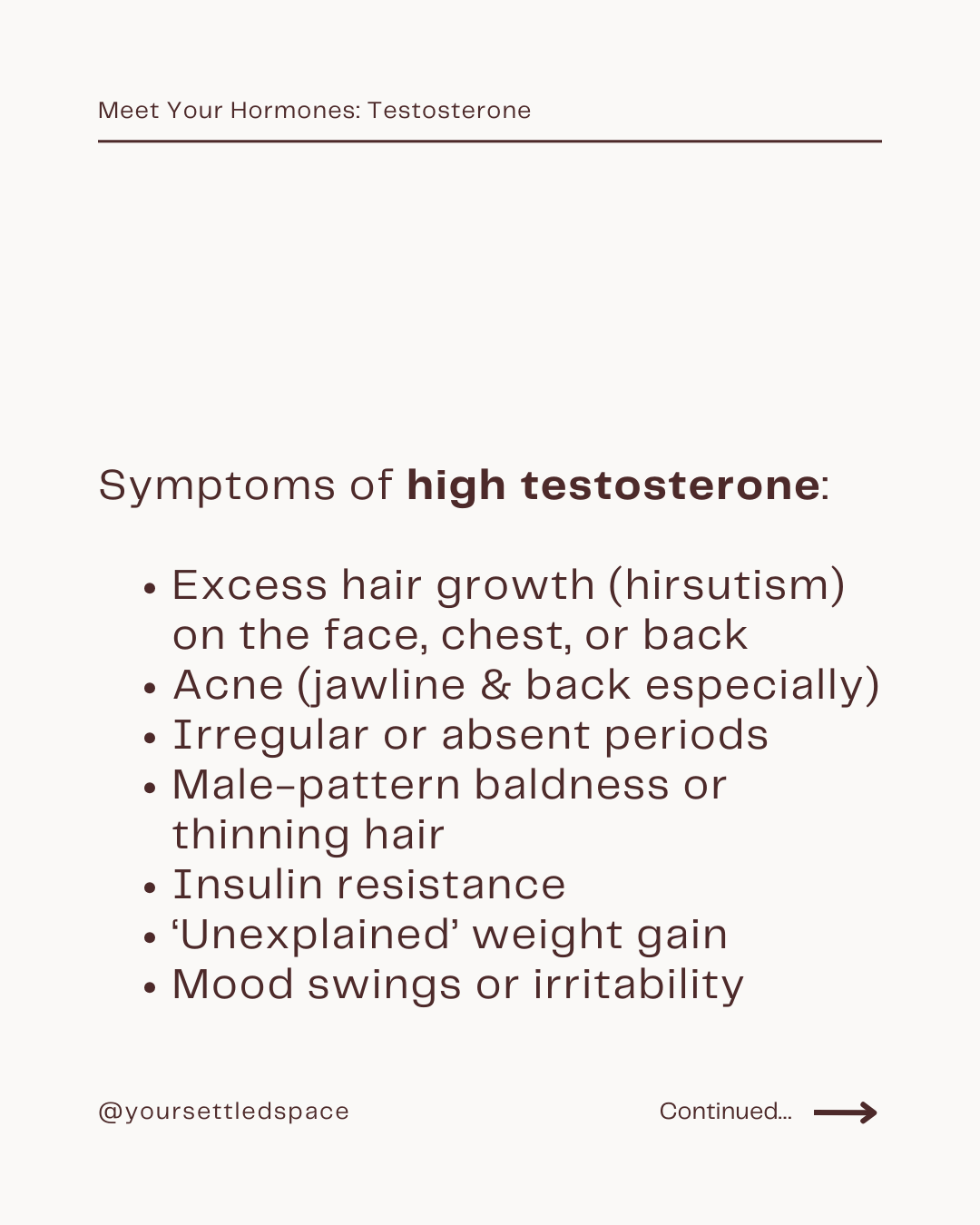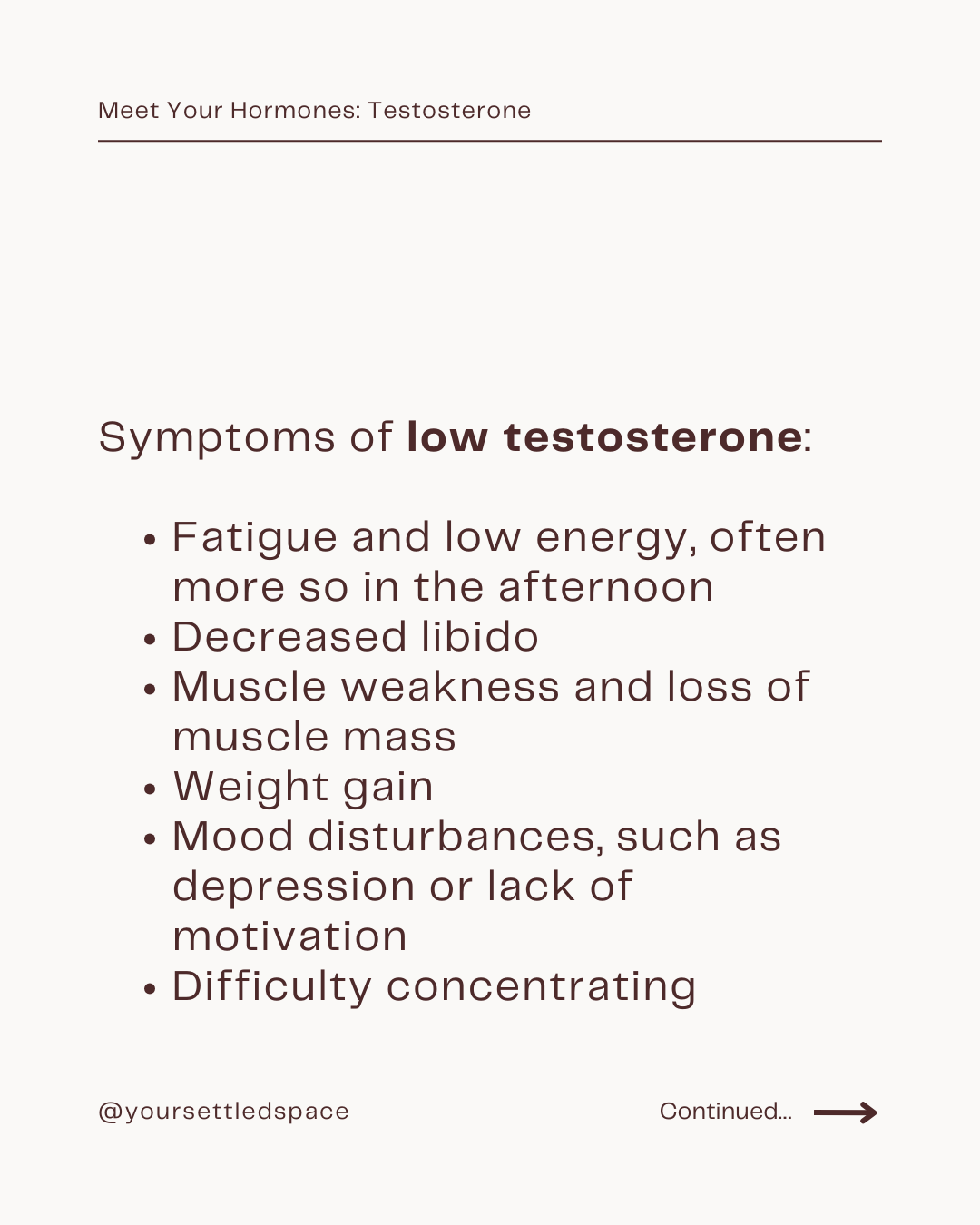Meet Your Hormones: Testosterone
Testosterone is often thought of as a "male hormone", but did you know that it plays a crucial role in women's health too? From libido and muscle mass to bone density and mood, testosterone can significantly impact a woman’s overall wellbeing. In this post, we'll explore what testosterone does in the female body, how it interacts with other hormones, and what to watch out for when it comes to imbalances.
What Is Testosterone and Why Is It Important for Women?
Testosterone is a steroid hormone that belongs to the androgen group. In women, testosterone is produced in the ovaries (25%), adrenal glands (25%), and even the skin (50%). Despite its lower concentration in women compared to in men, testosterone is vital for maintaining several physiological functions, including:
Libido: Testosterone plays a key role in sexual desire and arousal.
Muscle Mass: It helps in maintaining muscle strength and mass. In fact, there is one theory that PCOS (Polycystic Ovary Syndrome), of which one trait can be high androgens, initially gave women an advantage from an evolutionary perspective, making them stronger and therefore more likely to survive!
Bone Density: Testosterone contributes to bone health by helping to maintain bone density, reducing the risk of osteoporosis.
Mood and Energy: Balanced testosterone levels can improve mood, boost energy, and support cognitive function.
The Role of Testosterone in Hormonal Balance
Your testosterone levels can influence, and be influenced by, other hormones in your body. When testosterone levels are too high or too low, it indicates that other hormones are likely out of balance as well.
In your bloodstream, testosterone exists in two forms:
Total Testosterone: This measures the total amount of testosterone, including both free and bound testosterone.
Free Testosterone: This is the active form that is not bound to proteins like sex hormone binding globulin (SHBG) or albumin. Free testosterone is what the body can actually use, and therefore is what causes testosterone-related symptoms.
What Is SHBG and Why Does It Matter?
SHBG, or Sex Hormone Binding Globulin, is a protein that binds to hormones like testosterone and estrogen, making them inactive while they are bound. This means that SHBG controls the amount of free, usable testosterone in the body. When we talk about symptoms of high or low testosterone, we’re often referring to high or low levels of free testosterone.
This distinction is crucial because it explains why someone might experience symptoms of testosterone imbalance even when their total testosterone levels appear normal on a blood test. A more detailed test that measures free testosterone and SHBG levels can provide a clearer picture.
Signs of Testosterone Imbalance in Women
Testosterone imbalances can manifest in various ways, depending on whether levels are too high or too low. Let’s take a look at the symptoms first.
Symptoms of high testosterone:
Excess Hair Growth (Hirsutism): This can appear on the face, chest, or back. It is not referring to hair on the head.
Acne: Particularly along the jawline and on the back.
Irregular or Absent Periods: High testosterone can disrupt the menstrual cycle due to its influence on other hormones.
Hair Thinning on the Head, or Male-Pattern Baldness: Often noticeable around the crown or temples.
Insulin Resistance: This can lead to weight gain and other metabolic issues.
Mood Swings or Irritability: Hormonal imbalances often affect emotional wellbeing.
Symptoms of low testosterone:
Fatigue: Particularly noticeable in the afternoon.
Decreased Libido: A drop in sexual desire and arousal.
Muscle Weakness: Along with a loss of muscle mass.
Weight Gain: Especially in the abdominal area.
Mood Disturbances: Such as depression, anxiety, or lack of motivation.
Difficulty Concentrating: Often referred to as "brain fog."
Understanding the Causes of Testosterone Imbalance
Here are some common causes of high free testosterone or low SHBG in women:
Insulin Resistance
Obesity
Hypothyroidism
Cushing’s Syndrome
PCOS (Polycystic Ovary Syndrome)
When to Seek Help
If you’re experiencing any of these symptoms, it might be worth investigating your testosterone levels (free and total) along with other key hormones such as LH, androstenedione, DHEA, and SHBG. A comprehensive blood test can provide valuable insights into your hormone health.
Final Thoughts
Testosterone may be a small part of the hormonal puzzle, but its impact on women's health is significant. Whether you're dealing with hormonal acne, unexplained weight gain, or mood swings, understanding your testosterone levels could be key to finding relief. If you suspect a testosterone imbalance, consider reaching out to a healthcare provider for personalized advice and treatment options.
Got questions about testosterone? Drop them in the comments!
If you're ready for a personalised plan to get your hormone health back on track, book a free initial call with me here. Your health journey is unique to you, and hormones can be pretty complex - let's navigate it together.




